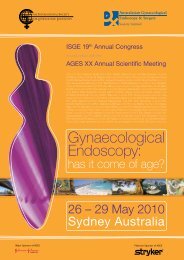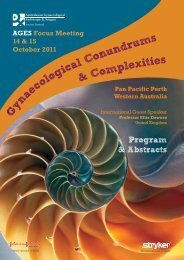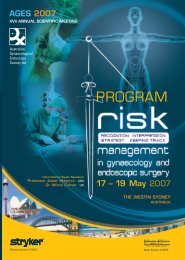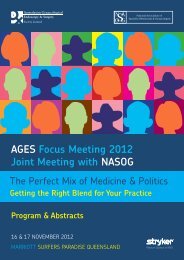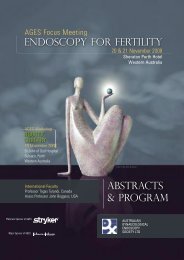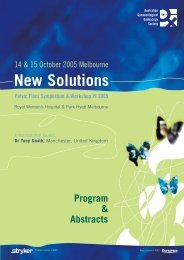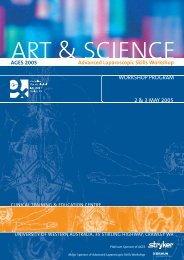AGES XXIII Annual Scientific Meeting 2013 Abstracts & Program
AGES XXIII Annual Scientific Meeting 2013 Abstracts & Program
AGES XXIII Annual Scientific Meeting 2013 Abstracts & Program
You also want an ePaper? Increase the reach of your titles
YUMPU automatically turns print PDFs into web optimized ePapers that Google loves.
The Pelvis in Pain<br />
<strong>Program</strong> <strong>Abstracts</strong> - Saturday 9 March<br />
Endometriosis and Beyond<br />
• A doctor finds bladder wall inflammation, pinpoint<br />
bleeding or ulcers during an exam with a special telescope<br />
(called a cystoscope) that looks inside your bladder<br />
• Your doctor has ruled out other diseases such as urinary<br />
tract infections, vaginal infections, bladder cancer, sexually<br />
transmitted diseases. Diagnostic tests that help identify<br />
other conditions include urinalysis, urine culture, urine<br />
cytology, cystoscopy with distension of the bladder under<br />
anaesthesia, and occasionally biopsy of the bladder wall.<br />
How is interstitial cystitis treated<br />
Because the causes of IC are unknown, current treatments<br />
are aimed at relieving symptoms. One or a combination<br />
of treatments helps most people for variable periods.<br />
As researchers learn more about IC, the list of potential<br />
treatments will change, so patients should discuss their<br />
options with a doctor.<br />
Most people feel better after trying one or more of the<br />
following treatments:<br />
• Diet. You may need to avoid alcohol, spicy, acidic foods<br />
and tobacco.<br />
• Bladder distension. About one third of people feel better<br />
after having a bladder distension. Under anaesthesia, a<br />
doctor overfills your bladder with fluid. This stretches the<br />
walls of the bladder. Doctors don’t know why distension<br />
helps. It may interfere with pain signals sent by nerves in<br />
the bladder. In some people they feel their pain is worse<br />
after this procedure<br />
• Medication. Your doctor may have you take an oral<br />
medicine called pentosan polysulfate (brand name:<br />
Elmiron). This medicine helps to protect the lining of the<br />
bladder wall from the toxic parts of urine. Elmiron may be<br />
expensive in some countries. It helps about 40% of patients.<br />
Another medicine that may help is amitriptyline (brand name:<br />
Endep). It blocks pain and reduces bladder spasms. This<br />
medicine can make you sleepy, so it’s usually taken at bedtime.<br />
Oral antihistamines or cimetidine have helped some patients<br />
with an allergic tendency.<br />
Physical therapies and trigger point therapy can help the<br />
pelvic floor muscle spasm that accompanies bladder pain<br />
syndrome.<br />
Bladder instillation. During a bladder instillation, a catheter<br />
(a thin tube) is used to fill your bladder with a liquid<br />
medicine. You hold the medicine inside your bladder for<br />
a few seconds to 15 minutes. Then the liquid drains out<br />
through the catheter. Treatments are given every one to two<br />
weeks for six to eight weeks. The treatment can be repeated as<br />
needed. The substances used can include<br />
• Heparin alone or in combination<br />
• Steroids alone or in combination<br />
• Local anaesthetic with or without sodium bicarbonate<br />
• Dimethyl sulfoxide or DMSO (Rimso-50), a chemical<br />
solvent from wood pulp which has several uses in<br />
medicine. It is known to reduce inflammation and block<br />
pain in about 3/4 of IC patients. It has the side-effect of<br />
leaving patients smelling of garlic that may last up to 72<br />
hours after treatment.<br />
Difficult Cases<br />
Some treatments which are being currently assessed for<br />
people who do not respond to the above options include<br />
botulinum toxin bladder injection and sacral nerve<br />
stimulation. Some people need stronger pain medication<br />
such as morphine like drugs or gabapentin (nerve<br />
modulating drugs). Referral to a multidisciplinary pain<br />
clinic may be of benefit in severe cases. An extremely<br />
small minority of patients are not helped with regular<br />
treatments and require surgery. Many approaches and<br />
techniques are used, each of which has its own advantages<br />
and complications that should be discussed with a surgeon.<br />
Surgery should be considered only if all available treatments<br />
have failed and the pain is disabling.<br />
What else can I do to help my symptoms<br />
• Diet - Alcohol, tomatoes, spices, chocolate, caffeine, citrus<br />
drinks, artificial sweeteners and acidic foods may irritate<br />
your bladder. Try eliminating these foods from your diet<br />
for a couple of weeks. Then try eating one food at a time<br />
to see if it makes your symptoms worse.<br />
• Smoking - Many people with interstitial cystitis find<br />
that smoking makes their symptoms worse. Because<br />
smoking is also a main cause of bladder cancer, people<br />
with interstitial cystitis have another good reason to quit<br />
smoking.<br />
• Bladder training – If you have no pain, many people<br />
can train their bladder to hold more. You can train your<br />
bladder by going to the bathroom at scheduled times and<br />
using relaxation techniques. After a while, you try to make<br />
the time you can wait longer. Your physiotherapist can<br />
help you with bladder training and relaxation techniques.<br />
• Physical therapy and biofeedback - People with interstitial<br />
cystitis may have painful spasms of the pelvic floor<br />
muscles. If you have muscle spasms, you can learn<br />
exercises to help strengthen and relax your pelvic floor<br />
muscles.<br />
• TENS (“transcutaneous electrical nerve stimulation”).<br />
You can use a TENS machine to put mild electrical pulses<br />
often over the bladderdo this at least two times a day.<br />
You might do it for a few minutes, or you might do it<br />
for a longer time. Ideally, this is commenced under the<br />
supervision of a physical therapist.<br />
• Relaxation therapy, stress reduction, hypnotherapy and<br />
acupuncture can have a beneficial role in some people.<br />
Where can I get more information about interstitial cystitis<br />
The support of family, friends and other people with<br />
interstitial cystitis is very important to help you cope with<br />
this problem. People who learn about interstitial cystitis and<br />
participate in their own care do better than people who don’t.<br />
People with interstitial cystitis can get more information on<br />
this disease from these groups:<br />
• Interstitial Cystitis Support Group of Australia<br />
Chairman: Alice Terry<br />
P.O. Box 767, Kingswood<br />
2747 New South Wales Australia<br />
http://www.users.bigpond.net.au/ICSG/




